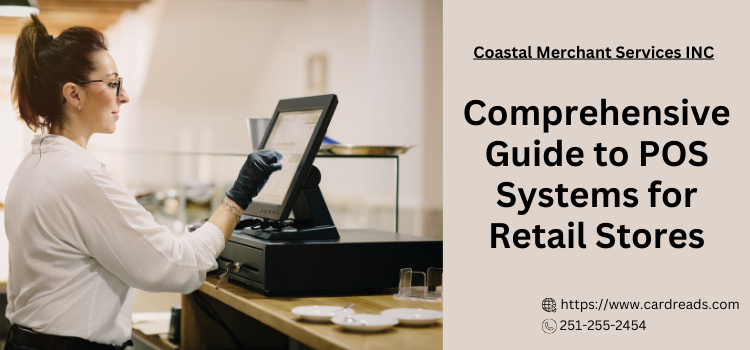Optimizing Retail Management: The Comprehensive Guide to POS Systems for Retail Stores
In the ever-evolving landscape of retail, efficiency and customer satisfaction are pivotal. This is where POS systems for retail stores come into play, revolutionizing the way retail businesses operate. As a provider of comprehensive consultation services and a supplier of top-notch POS devices, Cardreads stands at the forefront of this technological revolution. We delve into the intricacies of POS systems, addressing vital questions and illustrating how they can transform the retail experience.
Here are the Key Questions related to POS System for Retail Stores
-
Key Features in a POS System for Retail Stores
When selecting a POS system for a retail store, several key features are crucial:
- Sales Processing: The core functionality; it should handle various payment methods and transactions smoothly.
- Inventory Management: Real-time tracking of stock levels, orders, and deliveries.
- Customer Management: Tools for storing customer data and managing loyalty programs.
- Reporting and Analytics: Detailed reports for sales, inventory, customer preferences, and more.
- Integration Capabilities: Ability to integrate with other systems like e-commerce platforms and accounting software.
- User-Friendly Interface: Easy navigation and minimal training requirements.
-
Enhancing Operational Efficiency
A POS system streamlines retail operations significantly:
- Speedy Transactions: Reduces checkout times, enhancing customer service.
- Automated Inventory Management: Minimizes the chances of human error, ensuring optimal stock levels.
- Centralized Data Management: Aids in managing multiple store locations from a single platform.
- Reduced Administrative Work: Automates routine tasks, freeing up staff for more critical operations.
-
Traditional vs. Modern POS Systems
The evolution from traditional to modern POS systems has been transformative:
- Traditional Systems: Earlier POS systems were primarily cash registers with basic sales recording capabilities.
- Modern Systems: Today’s POS systems are multifaceted, offering inventory management, customer relationship management, reporting, and analytics.
-
POS Systems and Inventory Management
Integration of POS systems with inventory management is a game-changer:
- Automated Stock Updates: Sales and returns instantly update inventory levels.
- Inventory Forecasting: Helps in predicting stock requirements based on sales trends.
- Order Management: Streamlines the process of ordering and receiving stock.
-
Cost Implications of Implementing a POS System
The cost of implementing a POS system varies:
- Software Subscription: Most modern POS systems offer cloud-based services with monthly subscriptions.
- Hardware Costs: Includes the purchase of scanners, receipt printers, and terminals.
- Maintenance and Support Fees: Ongoing costs for system updates and technical support.
-
Enhancing Customer Experience with POS Systems
POS systems significantly enhance the customer experience:
- Quicker Checkouts: Reduces wait times.
- Personalized Interactions: Stores customer purchase history for tailored recommendations.
- Loyalty Programs: Easily manage rewards and discounts.
-
POS Systems for Sales Tracking and Reporting
Robust sales tracking and reporting are key functionalities:
- Real-Time Sales Data: Provides insights into daily sales performance.
- Customizable Reports: Allows for tailored reports on various aspects of the business.
- Data-Driven Decisions: Helps in making informed decisions based on accurate sales data.
-
Security Features in POS Systems
Security is paramount in POS systems:
- Data Encryption: Protects sensitive customer and business data.
- Compliance with Standards: Like PCI DSS for payment processing.
- Secure User Access: Role-based access controls for employees.
-
User-Friendliness for Employees
Modern POS systems are designed with user-friendliness in mind:
- Intuitive Interfaces: Minimal learning curve.
- On-Screen Guidance: Helps new users navigate the system.
- Training and Support: Most providers, like Cardreads, offer comprehensive training and support.
-
POS Systems for Different Business Sizes
POS system needs vary by business size:
- Small Retail Businesses: May require basic systems with essential sales and inventory features.
- Large Retailers: Require more robust systems with advanced analytics, multi-store management, and extensive integration capabilities.
Cardreads: Your Partner in Retail Success
At Cardreads, we understand that choosing the right POS system is crucial for your retail business. We offer free consultation services to help you select the perfect system tailored to your specific needs. Whether you’re a small boutique or a large retail chain, our expertise in supplying state-of-the-art POS devices ensures that your retail operations are optimized for success.
In Conclusion
The right POS system for retail stores is a cornerstone for modern retail success. With the advancements in POS technology, retail businesses can enjoy enhanced operational efficiency, better customer satisfaction, and insightful data analytics. Cardreads is committed to helping you navigate this choice, ensuring that your retail business is equipped with the best tools to thrive in today’s competitive market.
Embrace the future of retail with a POS system that brings efficiency, accuracy, and growth to your business. Connect with Cardreads for expert guidance and quality POS solutions tailored to your retail needs.
FAQs About POS Systems for Retail Stores
A POS system offers advanced features like inventory management, customer data handling, and analytics, beyond just processing sales transactions.
Yes, many modern POS systems seamlessly integrate with e-commerce platforms, unifying online and offline sales channels.
Most modern POS systems are user-friendly with minimal training required. Providers like Cardreads offer comprehensive training and support.
Cloud-based POS systems offer advantages like real-time data access, scalability, and often, lower upfront costs.
POS systems streamline returns and exchanges by keeping track of sales history, updating inventory in real-time, and maintaining customer satisfaction.




